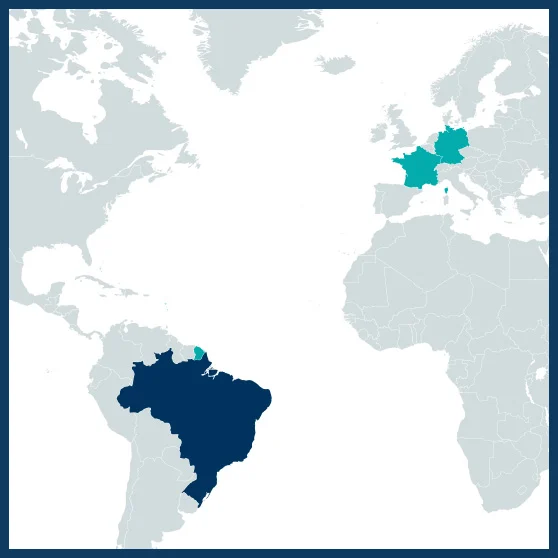01/04/2021 – 31/03/2024
€ 579,963
Prof. Dr. Halley Caixeta de Oliveira
halley@uel.br
Coordinator: Animal and Plant Biology – State University of Londrina – Londrina – Brazil
Biochemistry and Biotechnology, General Biology, Agronomy – State University of Londrina – Londrina – Brazil
Socioeconomics – Institute of Rural Development of Paraná-IAPAR-EMATER – Londrina – Brazil
Environmental Engineering – São Paulo State University – Sorocaba – Brazil
Bioactivity Assessment and Toxicology of Nanomaterials – University of Sorocaba – Sorocaba – Brazil
Natural and Human Sciences – Federal University of ABC – Santo André – Brazil
Continental Ecosystems and Environmental Risks (ECCOREV) – CNRS/Aix-Marseille University – Aix-en-Provence – France
Microbial Ecology of the Rhizosphere and Extreme Environments (LEMIRE) – BIAM/CEA/ CNRS/Aix-Marseille University – Saint-Paul-lez- Durance – France
Fungal Biotechnology in Wood Science – Technical University of Munich – Munich
– Germany
Network Biology and Biochemical Plant Pathology – Helmholtz Zentrum München (HZM), Neuherberg, Germany

Climate projections indicate higher precipitation variability along this century with more frequent drought extremes, which would have a strong influence on forest biodiversity due to impacts on ecosystem functioning, tree ecophysiology, and microbial communities. Reforestation with native trees has been considered a useful strategy to mitigate climate change. Still, its success is hindered by the high mortality of tree seedlings in the field and the difficulty in restoring native soil microbiota, which are amplified by drought events. Thus, it is of great interest to improve seedling production practices in nurseries, with the induction of mechanisms that increase drought tolerance.
RESTORE’s main objective is to explore plant-microbiota interactions in forest ecosystems facing increased drought stress due to climate change, allowing the development of nature-based solutions to improve forest restoration initiatives.
In this study, the responses of trees and associated soil microbiota to drought stress in three different forest types (Brazilian Seasonal Semideciduous Atlantic Forest, French Deciduous Mediterranean Oak Forest, and German Mesic Temperate Forest) will be evaluated, allowing to search for unifying patterns among geographically distant sites, across gradients, and by the use of experimental treatments.
Further, the application of different nature-based solutions as innovative strategies for improving tree seedling production and soil microbiome functioning/structuring will be tested. Associative microorganisms from tree species of the three ecosystems will be isolated and characterised to obtain beneficial microbial strains that can be used as bio inputs for seedling production. Moreover, biodegradable and biocompatible nano/microparticles and composite materials produced from natural sources will be used as carrier systems for plant growth regulators, microbial living cells, or chemical elicitors to improve their delivery to the plants.
The efficiency of these nature-based solutions in inducing tree seedlings’ tolerance to drought stress and the corresponding effects on soil microbiota diversity and functioning will be evaluated using different approaches, including greenhouse cultivation, nursery seedling production, and field trials.
The economical balance of the proposed solutions will be evaluated through cost-effectiveness and cost-benefit analyses, and the evaluation of their social acceptance will take advantage of the engagement of stakeholders in the project. Restoration practitioners who plan, execute, and manage restoration projects will be first assessed by means of phone calls, e-mails, and in-person meetings to rise their potential contributions to and gain from their involvement in the project. The stakeholders who feel motivated to join the project will be invited to discuss firstly research questions and experimental designs, then project development and results, and later project evaluation and conclusions, by means of surveys, formal workshops, meetings, and joint experiments. Thus, in addition to contributing to the basic knowledge of the mechanisms of drought response of trees and soil microbiota, work undertaken in RESTORE will seek to improve reforestation programs’ success, with important environmental, economic, and social impacts. The success of the project is based on an international multidisciplinary consortium (plant ecophysiologists, soil and rhizosphere microbiologists, microbial ecologists, chemists, engineers, economists) that will collaborate on a range of nature-based solutions.